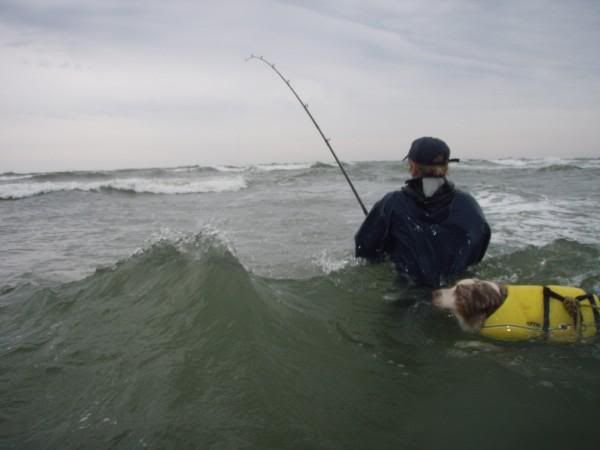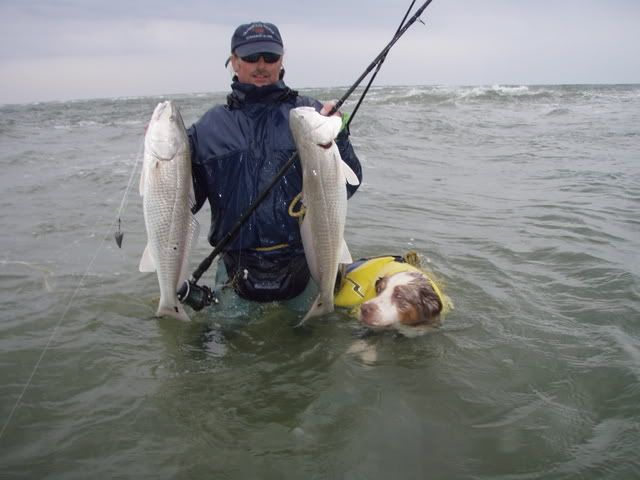-
 rip current do's and don'ts
rip current do's and don'ts
We'll be fishing the ocean soon, I had a few close calls last year. Some other guy here said his friend was wading in the back and drowned. I think the front is a lot more dangerous. I like to fish some inlets and wade out on low tide because they hold fish. So far I have been lucky. What I do is learn an inlet by having waded near the rocks at low tide, and know where the deeper water is by marking it on a point of land in my head, and remembering that. What do some of you guys do or recommend for fishing rip currents at a point or inlet currents?
-

You're either brave or crazy, willie!  I like to fish the inlets I can walk out on the rocks to, too scared to wade them. As for rip currents, I fish them with plugs, from the safety of the shore. That may sound like sissy fishing, but I don't want to get carried away to England.
I like to fish the inlets I can walk out on the rocks to, too scared to wade them. As for rip currents, I fish them with plugs, from the safety of the shore. That may sound like sissy fishing, but I don't want to get carried away to England. 
-

Rip currents can sweep you away in a moment's notice. They can also be very good for bass fishing. Remember that they are stronger during a full moon. Wading in them? Maybe near slack tide would be ok.
-

I think it's a good idea to know the water depths as well. When I am wading, I slowly put one foot in front of me sideways as I get near where I think a channel might be. As I start to feel the slope I adjust my balance. I can think of better challenges than swimming in heavy current.
-
-

Incredible catch jon.  I would have thought that the water would be too cold for the dog.
I would have thought that the water would be too cold for the dog. 
-
 Rip currents - Do's and Don'ts
Rip currents - Do's and Don'ts
This is a response to the person who lost their life in Asbury Park tonight as they got dragged down by the strong rip current.
The jetties there have similar characteristics to other jetties in the area in that some of them are notched. This allows the water to come in parallel to the beach, and swirl around in a vortex sometimes.
Tonight, coming off a full moon, the current was probably stronger than usual.
I'm not trying to assess blame here. People who are in the water a lot, fishing, swimming, surfing, skishing, should know about rip currents because their safety depends on their knowledge.
However, there are people who visit the surf only a few times a year. Even in a river, strong tidal currents can carry you to your death, as in the case earlier this year of the guy who drowned on the back side of Sandy Hook.
If you know anyone who could stand to learn more about these currents, please send this thread, or C&P it to them. Feel free to add whatever info you want or find out there.
I don't expect to save the world with this thread. If...one more person becomes more safety conscious when dealing with rip currents because of it, then it will have been worth it.
Remember that any of your family members can be taken from you in an instant if they got caught up in these currents. Thanks for reading. 
-
 Do's and Don'ts of Rip Currents
Do's and Don'ts of Rip Currents
WHAT TO DO: If caught in a rip current, either let it carry you to its end before swimming, or swim parallel to shore until it releases you. Try to alert someone on shore that you are in trouble.
DO: Throw flotation devices to someone caught in a rip current.
DO: Call 911 or alert a lifeguard for help
NOT TO DO: Do not fight a rip current. You can exhaust yourself and drown.
DO NOT: Enter the water in an attempt to rescue someone caught in a rip current; instead call for help.
The rest of the article tells of a mother who lost her son to the ocean, and started a foundation to raise awareness:
http://www.tcpalm.com/news/2010/feb/...safeguards-at/
-
-
 Rip current safety tips
Rip current safety tips
http://www.ripcurrents.noaa.gov/tips.shtml
Rip Current Safety Tips

Learn how to swim!
When at the beach:
- Whenever possible, swim at a lifeguard-protected beach.
- Never swim alone.
- Learn how to swim in the surf. It's not the same as swimming in a pool or lake.
- Be cautious at all times, especially when swimming at unguarded beaches. If in doubt, don’t go out.
- Obey all instructions and orders from lifeguards. Lifeguards are trained to identify potential hazards. Ask a lifeguard about the conditions before entering the water. This is part of their job.
- Stay at least 100 feet away from piers and jetties. Permanent rip currents often exist along side these structures.
- Consider using polarized sunglasses when at the beach. They will help you to spot signatures of rip currents by cutting down glare and reflected sunlight off the ocean’s surface.
- Pay especially close attention to children and elderly when at the beach. Even in shallow water, wave action can cause loss of footing.
If caught in a rip current:
- Remain calm to conserve energy and think clearly.
- Never fight against the current.
- Think of it like a treadmill that cannot be turned off, which you need to step to the side of.
- Swim out of the current in a direction following the shoreline. When out of the current, swim at an angle--away from the current--towards shore.
- If you are unable to swim out of the rip current, float or calmly tread water. When out of the current, swim towards shore.
- If you are still unable to reach shore, draw attention to yourself by waving your arm and yelling for help.
If you see someone in trouble, don't become a victim too:
- Get help from a lifeguard.
- If a lifeguard is not available, have someone call 9-1-1.
- Throw the rip current victim something that floats--a lifejacket, a cooler, an inflatable ball.
- Yell instructions on how to escape.
- Remember, many people drown while trying to save someone else from a rip current.
-


Originally Posted by
nitestrikes

http://www.ripcurrents.noaa.gov/tips.shtml
Never swim alone.
- Learn how to swim in the surf. It's not the same as swimming in a pool or lake.
- Be cautious at all times, especially when swimming at unguarded beaches. If in doubt, don’t go out.
One of the most important ones.You would think it was so obvious people don't have to write it on a list. I guess not.
Tags for this Thread
 Posting Permissions
Posting Permissions
- You may not post new threads
- You may not post replies
- You may not post attachments
- You may not edit your posts
-
Forum Rules



 Reply With Quote
Reply With Quote I like to fish the inlets I can walk out on the rocks to, too scared to wade them. As for rip currents, I fish them with plugs, from the safety of the shore. That may sound like sissy fishing, but I don't want to get carried away to England.
I like to fish the inlets I can walk out on the rocks to, too scared to wade them. As for rip currents, I fish them with plugs, from the safety of the shore. That may sound like sissy fishing, but I don't want to get carried away to England. 




 I would have thought that the water would be too cold for the dog.
I would have thought that the water would be too cold for the dog. 



